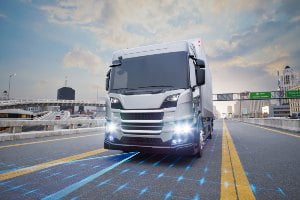You may think it will be a long time before you are sharing the road with self-driving commercial trucks. However, the future could arrive much sooner as a Pittsburgh-based company is planning to implement the use of driverless trucks at the end of this year. Pennsylvania is one of many states allowing autonomous vehicles to be tested or deployed without a human driver inside.
Table of Contents
Aurora Innovation Inc. has been testing driverless trucks and may use 20 such vehicles to transport cargo between Houston and Dallas toward the end of the year. They are starting in Texas because they are unlikely to encounter ice or snow there.
Aurora, which is based in Pittsburgh, has also been testing these vehicles at a track on the Monongahela River. These self-driving trucks are equipped with more than two dozen sensors, including cameras, lasers and radar to detect what is ahead and react appropriately.
Companies like Aurora are planning to begin using thousands of self-driving trucks in approximately three to four years. Driverless trucks should allow companies to deliver goods faster. Unlike human drivers, these vehicles will not need to take breaks.
Many people assumed companies would roll out autonomous vehicles in big cities. However, companies have faced pushback because of serious accidents that have occurred, like a crash involving a General Motors robotaxi. This means self-driving trucks are likely to be the first autonomous vehicles to be deployed en masse.
Are Self-Driving Trucks Safe?
 Did you know there are few federal regulations on self-driving trucks?
Did you know there are few federal regulations on self-driving trucks?
The government is essentially leaving it up to corporations to determine if their vehicles are safe.
Aurora maintains that they have been testing their self-driving vehicles for years. They say driverless trucks cannot become distracted or fatigued the way drivers can. There is also no risk of impaired driving. Aurora touts the effectiveness of their sensors, which can see further than human beings can.
However, computers can still make mistakes, according to Carnegie Mellon University professor Phil Koopman. He thinks companies are trying to be safe, but there are many factors to review.
For instance, while Aurora says their trucks detect and avoid pedestrians and other road hazards on test tracks, these vehicles were only traveling at 35 miles per hour. That said, Aurora has put these trucks on freeways in Texas with human safety drivers on board.
In fact, Aurora has used autonomous semi-trucks with human safety drivers since 2021. These trucks, which have traveled more than one million miles on public highways, have been involved in just three collisions. The company says all three collisions resulted from human driver error.
There is a federal database storing information about crashes between human-operated vehicles and autonomous vehicles. The database says there have been 13 such crashes since June 2021, but all of them were caused by human-operated vehicles.
While you might think it is more dangerous to put driverless vehicles on roads with higher speed limits, freeways may be safer. Think of it this way, there is a higher chance of something unexpected happening in a city, such as a pedestrian running into the road.
What if the Trucks Are Not as Safe as the Companies Say?
Even though federal authorities cannot prevent companies from putting autonomous vehicles on the road, they could order recalls or prevent companies from using certain trucks.
It is possible that the pressure to make a profit and avoid problems could motivate companies to avoid accidents. Chris Urmson, the CEO of Aurora, says putting an unsafe vehicle out on the road would be devastating to the company. He notes that the company is taking an uncompromising approach to safety, even if it hurts their profits.
Are Autonomous Trucks Going To Eliminate the Need for Truck Drivers?
There are legitimate concerns that autonomous vehicles will one day make truck drivers obsolete. However, Urmson says autonomous trucks are a complement to truck drivers, not a replacement.
Driverless trucks may help address a serious problem in the trucking industry, namely the shortage of drivers. The industry needs approximately 64,000 more drivers.
Liability in a Self-Driving Truck Crash
The rollout of autonomous vehicles raises many questions, especially about liability for any accidents that may occur. Many issues will need to be worked out over time, but generally, parties that could be held responsible for a driverless truck collision may include:
Vehicle Manufacturers
- Manufacturers could be held liable for defects or malfunctions with their vehicles.
- Liability could also be assessed for failure to adequately design, test or maintain the technology in these vehicles.
Companies Operating These Vehicles
- The companies that use these trucks may be held liable if they fail to properly maintain, monitor or supervise autonomous driving systems.
- Companies could be held liable if they neglected to properly train human operators on what to do in an emergency.
Truck Drivers
- At this point, autonomous vehicles you may encounter may not yet be fully autonomous. For now, there is a human being monitoring the system. If he or she does not respond appropriately to emergencies or fails to monitor the road, liability may be assessed.
- If the driver fails to follow safety protocols or overrides the autonomous system without a good reason, he or she may bear fault.
Third Parties
- Third parties involved in the maintenance or deployment of autonomous vehicles, such as contractors, suppliers, or service providers, may be held liable if negligence leads to a crash.
Injured in a Pennsylvania Truck Accident? Call Schmidt Kramer
Were you or your loved one seriously injured in a truck accident?
Our Harrisburg-based truck accident lawyers may be able to help you seek compensation for the damages you suffered at no upfront cost.
Truck accident cases are complex, but our law firm has the resources to fully investigate the crash and gather the evidence needed to build a strong claim.
Call to schedule your free legal consultation: (717) 727-2550.

